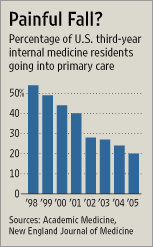Market Based Medicine
Ezra Klein and Megan McArdle debate the likely cost savings of consumer-based health care, with the former arguing it would come from poor patients having to ignore the excellent advice of doctors out of inability to pay and the latter contending doctors would quit ordering so many unnecessary tests if people had to pay for them out of their own pocket.
Both are likely right so far as it goes. Certainly, doctors would be forced to be more cost-conscious in their care routines under a purely market driven system. (Although it’s unclear how much of the unnecessary testing Megan describes is a product of featherbedding vice malpractice suit CYA.) Even so, the cost savings wouldn’t be sufficient to make health care affordable for the least of us.
Regardless, the current system is anything but market based (few of us have much incentive to care what our health care costs beyond the monthly premiums and deductibles) and there’s zero public appetite for making it more so. The momentum has been steadily and inexorably in the other direction for decades now.




The direction we’re going is the correct one – which is obvious if you’ve had any experience at all with changing health care “providers” (I’ve had 6 or 7 during my working career) instead of being the typical academician who gets good coverage and rarely changes.
An even-more-market-oriented system than what we have now would provide even less incentive for insurance companies to invest in treatments which have long payoff times, even if those treatments will make the patient much better and save money in the long-run. This is already a problem, but gets worse as you inject more “market magic”. Why on earth would you expect your insurance company to pay for a cheap treatment now which pays off in 5-15 years (avoiding a very expensive one) if the chance that they’ll be your insurance company in 5-15 years is low?
And to forestall the inevitable riposte – no, I don’t think that if businesses stop paying for health insurance, that we’d be any less likely to have this problem – more likely, in fact, under individual insurance contracts that you’d just get dropped whenever there’s a glimmer of something potentially expensive coming down the road.
I can understand why the current insurance-based system is described ny JJ as “anyting but market based” – given that it lacks many of the standard open market characteristics. but I think it’s important to note that the system is, indeed, market-produced. In other words, the current system with all its flaws is the result of a relatively free open market system allowed to run it’s course.
Individuals recognized the need for insurance, so they bought insurance in an open market. Employers recognized they could attract employees by offering health insurance at lower rates by bargaining group rates with insurance companies – all within the market system. The result of these market-based transactions is the system we have now.
That being the case, I think JJ is off-base when he states that there is “…zero public appetite for making it more [free market]…”. Ask yourself this question: How would it be possible to make the current system more of an open market than it already is? (And remember that making laws or policies that would regulate or exclude insurance companies or employers from offering health insurance is less open market, not more.)
The only answers to that question I can come up with are small tweaks to the tax code, or such. The bottom line is that today’s failing system is largely the product of an open market. Sometimes that happens.